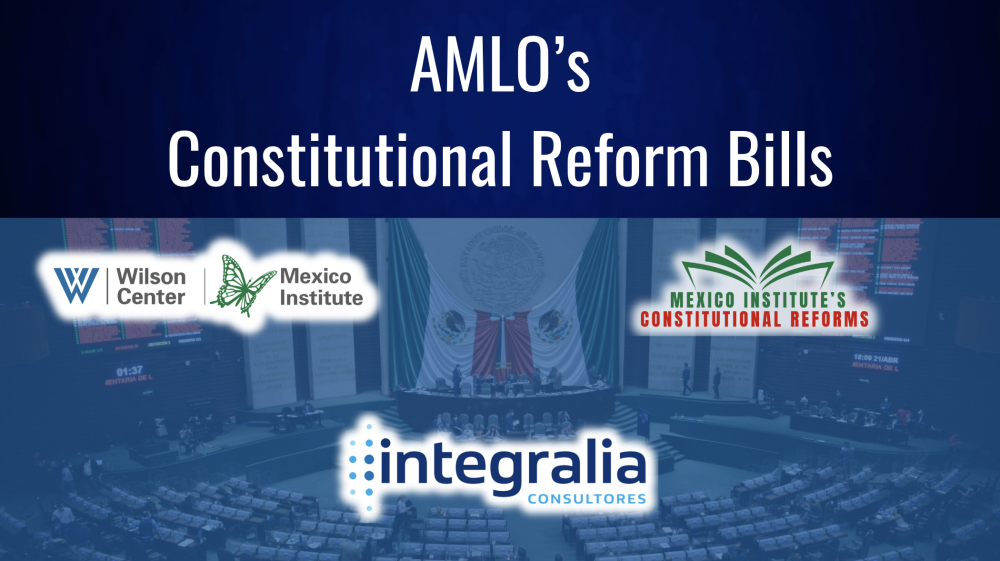
Background:
Following Mexico´s recent elections, President López Obrador's party, Morena, and its allies have secured a significant majority in Mexico's Chamber of Deputies and Senate, allowing them to amend the Constitution. Morena legislators plan to revisit the 18 reform proposals presented by President López Obrador in February 2024 once the new Congress convenes on September 1. Claudia Sheinbaum has agreed with the President to prioritize specific reforms in the initial month, with the most critical being a reform to the Judicial Branch. Other social programs and pension reforms are also expected to be addressed. This brief summary provides a general overview of the main reforms proposed by AMLO in February 2024.
Right to food, healthy environment, and water
Declare Mexico free of genetically modified corn, recognizing corn as a staple food and a symbol of national identity; guarantee and protect the human right to water, prioritizing its use for personal and domestic consumption above all else; and prohibit open-pit mining and hydraulic fracturing using water as the base fluid (fracking).
-
Animal protection and care
Elevate the prohibition of animal abuse to constitutional status, guarantee their protection, appropriate treatment, and conservation by the State, and empower the Congress of the Union to enact a general law on the subject.
-
Assignment of the National Guard to the Ministry of National Defense (Sedena).
To recognize the National Guard as a 100% military body attached to the Ministry of National Defense, specialized in providing support in public security tasks. The bill includes few civilian controls over the administration and operation of the National Guard.
-
Health protection from the use of toxic substances
Ensure the effective fulfillment of people's right to health. It proposes the prohibition of vaping devices and of toxic substances, chemical precursors, and synthetic drugs not legally authorized.
-
Preventive custody for "invoice issuers"
Expand the catalog of offenses that warrant the use of preventive custody as a matter of law, including tax fraud, smuggling, and the issuance, sale, purchase, or acquisition of fiscal documents, including invoices that cover simulated or non-existent transactions.
-
Rights of indigenous people
Recognize the legal personality and rights of indigenous and Afro-Mexican peoples and communities. Among the modifications, it establishes the recognition or strengthening of: (i) normative systems; (ii) free, prior, and informed consultation; (iii) cultural heritage and indigenous languages; (iv) traditional health and medicine; (v) media; (vi) community work; and (vii) the rights of girls, boys, teens, and women.
-
Welfare Programs
Adjust the wages of individuals within the Federal Judiciary Branch to limit them below the salary received by the President. Likewise, it aims to recognize republican austerity as a guiding principle of public service, establishing that no unnecessary goods or services may be acquired or contracted with public resources, including retirement benefits, pensions, special retirement schemes,, special savings accounts, private medical expense insurance, or life insurance, among others, not established by law.
-
Minimum wage
Establish that increases to the minimum wage are always higher than the annual observed inflation during that period. Likewise, it establishes that elementary school teachers, full- time police officers, National Guard and Armed Forces personnel, as well as doctors and nurses, will receive a monthly salary that cannot be lower than the average salary of workers registered at the IMSS.
-
Universal free medical care
Seeks to expand and specify the right to health. While the actual text states that the law will define the bases for access to health services and ensure their extension progressively, the proposed text details that the State will guarantee comprehensive, free medical care, including medical tests, surgical interventions, and necessary medications.
-
Electoral reform
Eliminate plurinominal legislators, reducing the Congress to 300 deputies and 64 senators, reduce campaign expenses for political parties; replace the INE with the INEC (National Institute of Elections and Consultations), which would be responsible for organizing national and local elections; decrease the number of councilors and state bureaucratic structures; elect electoral councilors and magistrates through popular vote, and lower the participation threshold so that popular consultations and recall of mandate are binding, among others.
-
Changes to the pension system
(it was later approved as a legal reform)
Establish that workers aged 65 or older who began contributing to the IMSS starting July 1, 1997, and those under the individual account regime in the ISSSTE, are entitled to a retirement pension equal to their last salary for an amount equivalent to the average salary, as recorded in the IMSS. Likewise, it includes that workers aged 60 or older will maintain their right to a guaranteed pension. To fulfill the above, the creation of a Welfare Pension Fund is proposed.
-
Passenger Trains
That the State regain control over railway tracks to provide passenger transportation services, allowing the participation of both public and private companies.
-
Strategic state industries (internet and energy)
Telecommunications: it establishes that the public internet service provided by the State-owned company (CFE Telecom) is a strategic area, adding a constitutional criterion to ensure that the prevalence of the State is not considered a monopoly.
Energy: it proposes changing the legal nature of CFE and Pemex from state productive enterprises to state public enterprises (Article 25).
-
Judicial Power Reform
Electing justices, magistrates, and judges by direct, secret popular vote, including judges of the TEPJF.
Transforming the Federal Judiciary Council, replacing it with two new bodies: the Judicial Discipline Tribunal and a Judicial Administration body whose competencies would include the functions of the TEPJF.
-
Housing system for workers
It seeks to transform the financing system administered by Infonavit into a housing system for all workers subject to section A regulations, in which, in addition to offering access to affordable and sufficient credit, rental housing will also be provided. Additionally, it proposes for Infonavit to become a direct participant in housing construction.
-
Youth Building the Future Program
Elevate the "Youth Building the Future" program to constitutional status and establish that the State will provide a monthly economic support equivalent to at least one minimum wage to unemployed people aged 18 to 29 who are not in school, in order to train them for work for a period of up to 12 months in companies and other economic units.
-
Disappearance of Autonomous Bodies
The proposal entails the elimination of Autonomous Constitutional Bodies and other bodies with technical autonomy outlined in the Constitution, with the exception of INE, INEGI, the Attorney General's Office, Banxico, and the National Human Rights Commission, among which are the Federal Economic Competition Commission (Cofece), the Federal Telecommunications Institute (IFT), the National Hydrocarbons Commission (CNH), the Energy Regulatory Commission (CRE), the National Council for the Evaluation of Social Development Policy (CONEVAL), the National Institute for Transparency, Access to Information and Protection of Personal Data (INAI), and the National System for Continuous Improvement of Education.
The content discussed is based on the original proposals presented by President López Obrador in February of this year.
The reforms will be discussed by the newly elected Congress starting September 1, so the proposals' contents may change.
Author




